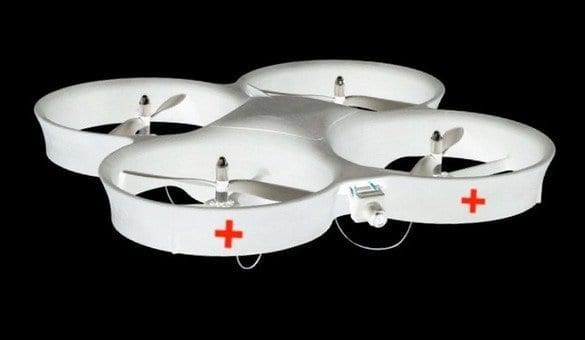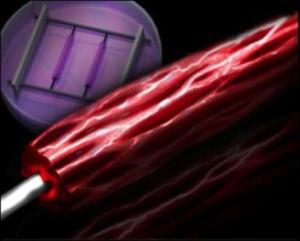
As the Internet of Things takes off, we’ll be able to quickly mobilize and use resources in amazing new ways–like a program that designs and builds your house at the touch of a button.
Looking at the history of networked technologies, there is an important underlying shift in the center-of-gravity, from communication, to commerce, to coordination. First, the early Internet dramatically changed the scope and speed of our communications with one another. Then, as it continued to mature, it disrupted commerce, (and our models for buying and selling are still in transition). At the Institute for the Future, my colleague Devin Fidler and I have been exploring the next story of network technology evolution that will unfold in the next decade, what we’re calling the new coordination economy.
We can already see early examples of the changes today from startups like Uber, Lyft, and Airbnb coordinate people and an overabundance of resources. Crowdfunding platforms like Kickstarter and Indiegogo are coordinating financing to help realize a wide range of projects. And dozens of cities around the country are using smartphones to coordinate CPR-trained citizens as potential first responders.
But these examples are just the beginning. Over the next decade, a few key technologies–machine learning, cloud computing, smartphones, and an Internet of connected and sensing physical objects–will finally work well together, transforming a rapidly expanding list of things into coordination platforms.
We will start to see the coordination economy take shape in the ways that we work. Services like oDesk and MobileWorks offer anyone an army of on-demand micro-workers perfectly tailored to the task at hand. Gigwalk takes micro-work to the streets, letting anyone find or hire pick-up work from the local area.
Toward the end of the decade and beyond, the technologies and algorithms of coordination have the potential to transform how we transport people and resources, from Google’s self-driving car to the drone delivery systems being prototyped by Matternet and ARIA.
As these tools of coordination are combined, their true disruptive power will be unleashed. Imagine a software app developed to “build a house” by first helping to customize the design, then automatically placing and tracking supply orders, hiring and coordinating workers through each stage of building, filing government paperwork, and automatically contracting for site cleanup and landscaping once the structure is completed.
The Latest Bing News on:
Coordination Economy
- Pakistan keen to transform Qatar ties into a robust economic partnership: PMon May 9, 2024 at 5:53 am
ISLAMABAD (APP) – Prime Minister Shehbaz Sharif on Thursday said that Pakistan was keen to transform its excellent ties with Qatar into a mutually beneficial robust economic partnership.
- Kenya floods: as the costs add up pressure mounts on a country in economic crisison May 9, 2024 at 3:35 am
Massive damage to key infrastructure and croplands means the effects of Kenya’s devastating floods will be felt for a long time.
- Energy Advisor: Bangladesh’s economic challenges originated from foreign nationson May 9, 2024 at 2:13 am
Prime Minister’s Energy Advisor Dr Tawfiq-e-Elahi Chowdhury has said all the economic challenges that the country ... There should be provision and coordination among the entities so that they can get ...
- Report warns economic instability has hit UK drug discoveryon May 9, 2024 at 2:05 am
A UK report has said that inflation and geopolitical instability have led to a “dramatic drop” in investment in smaller companies developing new medicines, with a knock-on effect on the entire life ...
- Philippines’ economy growth slows down at 5.7 percenton May 8, 2024 at 8:49 pm
THE country’s gross domestic product (GDP) was at 5.7 percent in the first quarter of 2024, or from January to March, the Philippine Statistics Authority (PSA) ...
- PH economy grows by 5.7% in Q1 2024on May 8, 2024 at 7:06 pm
Philippine economic growth saw an acceleration in the first quarter of the year from the three months prior, government data released on Thursday showed.
- In Economic Security, Trade-offs Aboundon May 8, 2024 at 9:25 am
Policymakers face complex cost-benefit considerations when intervening in the market to mitigate perceived risks, from climate change to competition with China.
- Creative economy opens up new space for economic developmenton May 7, 2024 at 8:31 pm
Exporting creative goods generates billions of dollars for Vietnam each year, but understanding of this economy is still in its very preliminary stages.
- Economic Coordination Committee approves 400,000 tonnes increase in wheat procurement targeton May 7, 2024 at 8:21 pm
ISLAMABAD: The Economic Coordination Committee (ECC) of the cabinet on Tuesday approved 400,000 tonnes of additional wheat procurement by the Centre, allowed the import of 200,000 ...
- PM Dbeibah asks Minister of Economy to prepare import budget for 2024on May 7, 2024 at 12:08 pm
The Prime Minister of the Government of National Unity, Abdul Hamid Dbeibah, has directed the necessity of organizing the conditions and work of the Ministry of Economy, and preparing a proposal for ...
The Latest Google Headlines on:
Coordination Economy
[google_news title=”” keyword=”Coordination Economy” num_posts=”10″ blurb_length=”0″ show_thumb=”left”]
The Latest Bing News on:
The technologies and algorithms of coordination
- Artisight Wins “Best Care Delivery Platform” Designation in 8th Annual MedTech Breakthrough Awards Programon May 9, 2024 at 7:15 am
Awards Program Recognizes Standout Digital Health & Medical Technology Products and CompaniesLOS ANGELES, May 09, 2024 (GLOBE NEWSWIRE) -- MedTech Breakthrough, an independent market intelligence ...
- The Election Year Risks of AIon May 9, 2024 at 7:14 am
Tech companies have taken important steps recently to help protect elections from AI, but more needs to be done to safeguard democracy.
- St. Luke’s earns accreditation for electronic records useon May 9, 2024 at 6:26 am
St. Luke’s University Health Network recently received the highest designation a health system can earn for its electronic medical records.
- Why are algorithms called algorithms? A brief history of the Persian polymath you've likely never heard ofon May 8, 2024 at 8:42 am
Algorithms have become integral to our lives. From social media apps to Netflix, algorithms learn your preferences and prioritize the content you are shown. Google Maps and artificial intelligence are ...
- Using algorithms to decode the complex phonetic alphabet of sperm whaleson May 7, 2024 at 9:03 am
The allure of whales has stoked human consciousness for millennia, casting these ocean giants as enigmatic residents of the deep seas. From the biblical Leviathan to Herman Melville's formidable Moby ...
- The Australian government wants to stop online harm fuelling violence and division. What can it do?on May 3, 2024 at 5:55 pm
Age verification technology and a ‘tech tax’ are among the proposals to address misinformation and misogynist content ...
- FTC head raises alarm over algorithm-driven healthcare price fixingon April 25, 2024 at 7:55 am
Ms. Khan emphasized that price fixing, which removes competition and raises prices for consumers, is against the law, even if done through algorithms. She explained how companies can use algorithms to ...
- How recommendation algorithms shape everything we interact with onlineon April 23, 2024 at 4:43 am
I love talking about algorithms with Quartz editors. Gabriela: I’m Gabriela Riccardi, the host of Quartz Obsession Season 7, where we’re taking a closer look at the technologies and the ideas ...
- MIT Technology Reviewon October 17, 2023 at 11:44 am
Founded at the Massachusetts Institute of Technology in 1899, MIT Technology Review is a world-renowned, independent media company whose insight, analysis, reviews, interviews and live events ...
- Algorithms and Lawon June 16, 2023 at 3:52 am
Algorithms permeate our lives in numerous ways, performing tasks that until recently could only be carried out by humans. Artificial Intelligence (AI) technologies, based on machine learning ...
The Latest Google Headlines on:
The technologies and algorithms of coordination
[google_news title=”” keyword=”the technologies and algorithms of coordination” num_posts=”10″ blurb_length=”0″ show_thumb=”left”]










